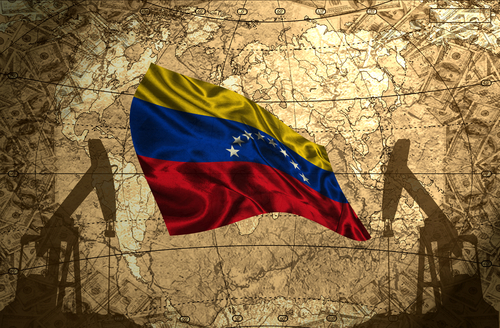Hugo Chavez’s Legacy: A Socialist Economy In Disrepair

Please note that we are not authorised to provide any investment advice. The content on this page is for information purposes only.
When examining the Venezuelan economy, there is no doubt that the poor did rather better under Chavez’s regime than they had done under, what Chavez termed, “the rotten elites” that had ruled the country in the two decades prior. However, Chavez’s legacy, to any economically literate person, is to have bequeathed Venezuelans an economy that could hardly be in more of a mess.
When examining the Venezuelan economy, there is no doubt that the poor did rather better under Chavez’s regime than they had done under, what Chavez termed, “the rotten elites” that had ruled the country in the two decades prior. However, Chavez’s legacy, to any economically literate person, is to have bequeathed Venezuelans an economy that could hardly be in more of a mess.
In the 1930s, when it looked as if Socialism in its various guises was going to sweep all before it, the Austrian economist Ludwig von Mises anatomized the inability of socialism to get to grips with economic realities and the way markets set prices in his book .
A touch over 80 years later, the death of Hugo Chavez, president of Venezuela – a failed experiment in socialism if ever there was one – has given economists in the large global financial institutions occasion to ponder the dire state of the Venezuelan economy post-Chavez and to wonder how and if the country will find its way back to something approaching economic normality.
There is no doubt that Venezuela’s poor did rather better under Chavez’s rambling, unscripted and ad hoc approach to economic policy-making than they had done under what Chavez termed “the rotten elites” that had ruled the country in the two decades prior to his assumption of the presidency. Getting at least some of the country’s oil wealth to trickle down to the poorest strata of society was something Chavez worked hard at and many will remember him fondly for this.
However, his legacy, to any economically literate person, is to have bequeathed Venezuelans an economy that could hardly be in more of a mess.
Related: Venezuela Economy
Related: Venezuela (Venezuela (Bolivarian Republic of)) Economic Statistics and Indicators
Whoever succeeds him is going to have a Herculean task cleaning it up. One can, for starters, point to at least two damning statistics concerning the Chavez legacy, though, in the interests of fairness, we might want to start with two positives. Venezuela has the fairest income distribution in Latin America, as measured by the Gini coefficient index. Plus there is 50 percent less poverty in Venezuela now, which is a tremendous achievement.
Unfortunately, the damning statistics are just as easy to state.
[quote]An article by points out that of the 14,000 private sector firms in the country in 1998, only 9,000 remain. The private sector has also shrunk by more than a third under Chavez; and despite being the fifth largest oil exporting country in the world, Venezuela has so neglected investment in the sector, particularly in its refining capacity, that it now has to import vast amounts of fuel at a price that is way in excess of what it gets for the crude it ships out.[/quote]One of the huge problems for European countries today has been the fact that populist politics favour those who are prepared to promise considerably more than the state has the power to deliver. In any socialist set-up, the temptation for politicians to promise far more than they can deliver is overwhelming. Chavez had Venezuela’s vast oil wealth to give away and he gave it away to the country’s poor with both hands, but petro-socialism, by definition, can’t survive the depletion of petro reserves.
The most powerful sustainable building block for any capitalist economy is the small to medium sized business sector, yet for your real, honest-to-God socialist, encouraging private wealth, which is what SMEs are all about, is anathema. They take the view that little capitalists are just big capitalists that haven’t had time to grow yet, so they neglect to foster the conditions that encourage the growth of the private sector. And with Chavez’s habit of nationalizing things that looked interesting, and then failing to run them efficiently, the private sector was understandably unimpressed and more than a little discouraged.
Related: Oil-Rich Polarizing Venezuela: Emigration-Immigration Puzzle
Related:
Related:
Will his successors alter the game plan? Probably not. Socialism is hugely tempting for populist politicians since giving stuff away makes people happy and happy voters make for happy politicians.
[quote]It’s just a pity that nothing in Chavez’s agenda makes for an economy that actually works. Petro-revenues will only take you so far. And even with petro-dollars flowing in, Venezuela’s economy is so moribund that the government’s main policy seems to be repeated devaluations of the currency. The succession, now that Chavez is gone, is likely to be a world-class poisoned chalice for whoever wins the next election in the country.[/quote]By Anthony Harrington
Anthony Harrington is an award-winning business and energy journalist, writing regularly for the Scotsman newspaper, the Glasgow Herald newspaper, Financial Director magazine, Pensions Insight magazine, CA Magazine, and a number of other publications. He won Business Finance Journalist of the Year 2006, Institute of Financial Accountants, and Journalist of the Year, State Street 2006 Institutional Press Awards, and was runner up in 2007 and 2008.
Death of Chavez: Return from la-la land for Venezuela? Probably not… is republished with permission from the QFinance Blog. Get the QFinance Dictionary of Business and Finance iOS app for a comprehensive guide to financial terms and expressions.




